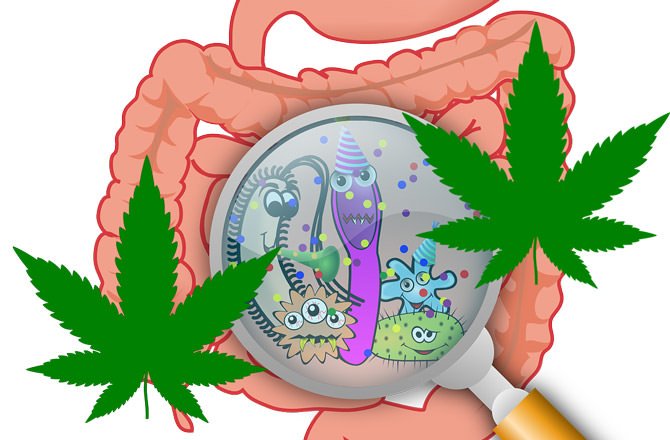A study was published last month that confirms what many medicinal cannabis users have been saying about the healing of their inflammatory bowel and gut issues through the use of cannabis. Researchers didn't even initially set out to test the effects of cannabis on gut inflammation, they were just looking at the mechanics of gut inflammation in mice.

Source, Source
Living with inflammatory bowel disease or other conditions -- such as ulcerative colitis or Crohn's disease -- involves physical discomfort of varying levels. The worst is Crohn's disease which is an autoimmune disease where the body's immune system mistakenly attacks the lining of the intestines. Those who suffer from these ailments have often turned to cannabis which has provided them relief from pain and discomfort.
Other studies [1, 2] have previously been done that showed the positive effect of cannabis on these medical conditions, but they didn't know what was really going on. But this recent study has been able to explain what's happening inside the body that makes cannabis so useful.
Researchers at the University of Massachusetts Medical School and the University of Bath figured out what's going on at th molecular level. Studying mice, they found that the active ingredient in marijuana (cannabinoids) restores the microbial balance that's lost in those with inflamed guts.
Regular guts don't have much inflammation, despite there being massive amounts of bacteria, viruses and yeasts. There presence can always trigger an inflammatory response, but they don't. Some get provoked when the body tries to fight off a foreign invader. But the harmony within our guts can be dysregulated and produce serious consequences for our health.
Two processes keep the internal peace going. One is the the migration of neutrophil cells across layers of the mucous lining of the intestines. This is part of the immune system's process to help fight infections. In the case of irritable bowel syndrome/disease (IBS/IBD), the immune system is not working properly, and the neutrophils attack the intestinal lining which leads to pain and discomfort from eating.
The other process to keep the balance and health is with a protein called P-glycoprotein. This protein stops inflammatory responses, and requires the body's natural cannabinoids called endocannabinoids to stop the out of control inflammatory response.
Endocannabinoids are involved in many physiological processes, with endocannabinoids receptors in many parts of the body. With IBD sufferers, the lack of natural endocannabinoids prevents the body from maintaining a balance between all the various parts of our internal functionality. This disequilibrium leads to unregulated inflammatory responses.
Enter cannabis to save the day. The cannabinoids from cannabis act on the endocannabinoid receptors and provide the cannabinoids the body needs to properly regulate the immune system, putting the body back into balance.
The papers authors plan to exploit this mechanism. They've already secured a patent to provide therapeutic relief for sufferers of inflammatory gut issues. Future drugs will be on the way to try to supplant the natural remedial powers of cannabis. And it will likely be more accessible since cannabis has long been restricted and shunned for consumption in society. But times are changing.
Hopefully cannabis itself can provide relief to more people without making the pharmaceutical industry richer, since all we would need to do is grow our own plants instead of buying pills.
References:
- Scientists Figured Out How Cannabis Tames Inflamed Bowels
- Study: Medical Cannabis Cures Inflammation in Gut – Hope for IBS, Crohns, Celiac Sufferers
- Acute inflammation: endogenous cannabinoids mellow the harsh proinflammatory environment
- The effects of Delta-tetrahydrocannabinol and cannabidiol alone and in combination on damage, inflammation and in vitro motility disturbances in rat colitis.
- Cannabidiol reduces intestinal inflammation through the control of neuroimmune axis.
Thank you for your time and attention. Peace.
If you appreciate and value the content, please consider: Upvoting, Sharing or Reblogging below.
 me for more content to come!
me for more content to come!
My goal is to share knowledge, truth and moral understanding in order to help change the world for the better. If you appreciate and value what I do, please consider supporting me as a Steem Witness by voting for me at the bottom of the Witness page.

